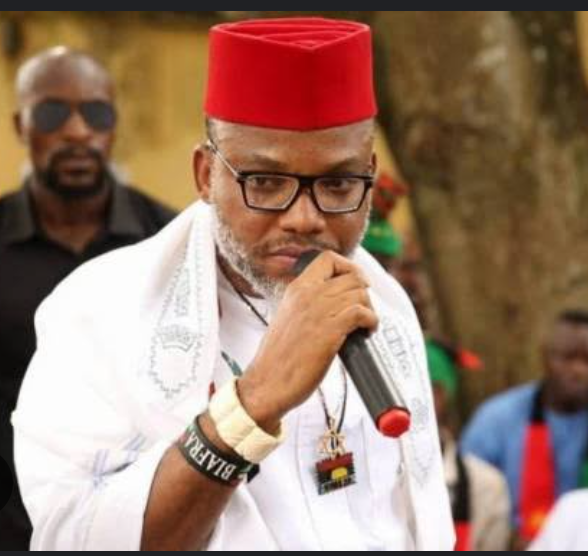By Kayode Sanni-Arewa
There is a widespread belief that releasing Nnamdi Kanu could pave the way for dialogue and a peaceful resolution to the longstanding issues in the southeastern region.
For quite a while, the leader of the Indigenous People of Biafra (IPOB), Nnamdi Kanu has been detained and the continued detention has been a basis for widespread debate and controversy in Nigeria.
Several leaders from the Southeastern region have been urging the Federal Government to release Kanu, including the Presidential Candidate of the Labour Party – Mr Peter Obi, even as security concerns within the region deepens.
In a recent move, the South-East Governors resolved to meet with President Bola Ahmed Tinubu to discuss possibilities for Kanu’s release even though the Attorney-General of the Federation and Minister of Justice, Lateef Fagbemi, says the offence of the detained IPOB leader is a difficult one and can only be resolved by a competent court of law.
Following the persistent calls for Kanu’s freedom, here are five compelling reasons why many believe he should be released from prison, focusing on human rights, the potential for dialogue and peace, legal fairness, political stability, and strong public sentiment.
1. Human Rights Concerns
For activists, Nnamdi Kanu’s prolonged detention raises significant human rights issues. Many believe his rights to freedom of speech and assembly have been violated. International human rights organizations have at various points called for his release, emphasizing the need for fair treatment and adherence to the rule of law.
2. Dialogue and Peaceful Resolution
There is a widespread belief that releasing Nnamdi Kanu could pave the way for dialogue and a peaceful resolution to the longstanding issues in the southeastern region. Proponents of this idea suggest that Kanu’s release could help de-escalate tensions and foster a more constructive conversation between the government and pro-Biafra groups.
3. Legal and Judicial Fairness
There have been concerns about the legality and fairness of Kanu’s arrest and detention. Critics argue that his trial has been marred by legal irregularities and that releasing him would demonstrate Nigeria’s commitment to upholding judicial fairness and due process.
4. Political Stability
Nnamdi Kanu’s detention has been a source of unrest and agitation within the South East. There are many who are of the opinion that his release could help calm the situation, reduce protests and violence, and contribute to overall political stability in Nigeria. According to those who push this idea, Kanu’s release could also improve relations between the government and the southeastern populace.
5. Public Sentiment and Pressure
There is significant public support for Nnamdi Kanu’s release, both domestically and internationally. It is thought in certain quarters that releasing him could address public grievances and demonstrate that the government is responsive to the concerns of its citizens, potentially boosting its credibility and legitimacy in the eyes of the people.
Kanu has been seeking legal means to regain his freedom, however, a recent fundamental human rights suit which his legal team instituted against the Federal Government was dismissed by Justice James Omotosho of the Federal High Court in Abuja.
Kanu has sued the Attorney-General of the Federation and the Department of State Service for ₦1bn in damages for alleged rights violations.
The IPOB leader claimed that the DSS and its director general violated his right to a fair hearing by allegedly preventing his lawyers from having unhindered interactions with him while he was being detained in preparation for his defence in his criminal
While delivering judgment, Justice Omotosho, held that Kanu failed to provide credible evidence to sustain his claims, that the IPOB leader’s interactions with his lawyers were interfered with, and that he was denied unhindered access to his lawyers, and that DSS officials eavesdropped on his conversations with his lawyers, which constituted a breach of his right to a fair hearing.

